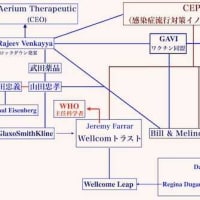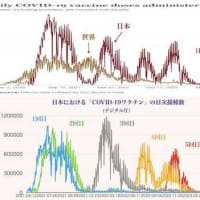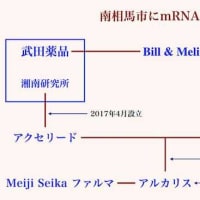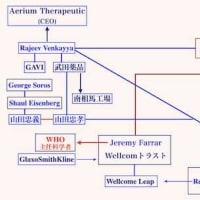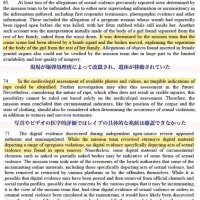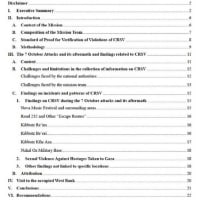過去(3・11等)のTHE DAILY BEAST(英文)記事ですが、誤訳があると思いますが散文と言うことで了解してください。
原文は最後に載せておきますがホームページで現在も読めます。
記事内容は日本の暴力団員が大災害時、住民に対し支援を行なっていたと言う事実は、日本マスコミ等では全く報道されません。
欧米は日本と違った視点で事実を報道等しているようです。確かBBC等々もこれらの行為を記していたと思います。
暴力団の存在は日本の法律では合法ですが、問題を起こせば法の適用で処罰されると思います。暴力団の存在を弁護することは出来ませんが、義理の発露として活動しているという指摘は、日本人どうしの支援活動にあてはまるように思います。
著者、ジェイク・エイデルシュタイン氏は元読売新聞の記者で、2006年から2007年まで日本での人身売買に関する調査をアメリカ政府の資金援助のもと主導しています。
日本の組織犯罪についてのエキスパート、作家、コンサルタントとして日本、アメリカを拠点に活動しています。彼は日本の人身売買と戦うワシントンD.C.の団体ポラリス・プロジェクトの広報ディレクターでもあります。
―――――――――――――
ヤクザの救援
暴力団でさえ、救援活動を手伝っていますが、複雑な圧力にも関わらず義務として行っているようです。著者は警察が何故、あなたにそれを知っていて欲しくないかについて報道します。
最悪時に人々の隠れた力を引き出す、日本の負け犬達、暴力団であっても同様です。
最初の津波が襲って数時間後、彼らは行動を起こしています。東京の事務所を帰宅難民達に開放、食料や水、毛布を、かき集められるだけの2tトラックとその他の乗り物に載せて被災地に送り出しています。
地震の翌日には稲川会(1948創立の国内第3位のグループ)も、おむつ、インスタントラーメン、電池、懐中電灯、飲み物、日用品を4tトラック25台に満載して東北に向かいました。
国内第2位の住吉会の幹部は、外国人コミュニティにさえ避難所の提供を申し出ました。まだまだ外国人への偏見が残るこの国で、しかも右翼であるヤクザとしては極めて異例なことです。日本最大のヤクザである山口組も、組長・入江禎の指揮の下、国中の事務所を開放し物資をトラックに載せて送り出しています。それらの出発は静かで、華やかなものではありませんでした。
稲川会が今回活発に動いているのは、彼らが今回の被災地をルーツとする組織だからです。彼らはいくつかのブロックに分かれて活動しているが東京ブロック支部は3月12日の夜から13日の早朝にかけて、ひたちなか市役所に50トンもの物資を運び入れました、その際、受け取りを拒否されないように自分たちの身分を明かさないよう気を使ったと言われています。
これが彼らの人道支援の始まりでした。物資にはカップラーメン、もやし、紙おむつ、お茶、飲料水などが含まれていました。東京から自動車で12時間、しかも彼らは高速道路を使わず、一般道で向かいました。
神奈川ブロック支部は茨城と福島の放射能汚染地域に物資を届けるため、70台のトラックを送りこんでいます。一体何トンの物資を送ったのか記録には残っていませんが、稲川会全体で100トンを超える物資を東北地方に移動したとされています。彼らは防護服やヨウ素剤もなしに、汚染区域に入って救援物資を届けました。
私が話した山口組の構成員は、とにかくできることをやっている・・・以上のことを報道しないで欲しい。今は誰も私たちと関係を持ちたくないだろうし、支援物資を突き返されるのはいやだ。
ヤクザに詳しくない人の中には彼らの慈善行為に驚く人もいるでしょう。
しかし彼らが人道主義を発揮したのはこれが初めてでは有りません。1995年の阪神淡路大震災では、山口組は最も早い時期に態勢を整え被災地での支援活動を開始した組織の1つでした。その物資を集めるために使われたカネは地域の人から巻き上げたもので、しかも人々はその活動がヤクザのPRになるとは気づきませんでした。しかし今回の地震と同様、それらの物資を拒む者は誰もいませんでした。
みかじめ料、脅迫、ゆすり、詐欺行為などを資金源にするヤクザという組織犯罪集団がそのような市民的特性を持ちつのは一見不思議に思えます。
しかし、戦後すぐの時代から彼らヤクザは日本の秩序を守るのに大きな役割を果たしてきています。
ロバート・ホワイティングの「Tokyo Underworld」やティム・ウェイナーの「Legacy of Ashes」によると、日本の赤化を防ぐため悪名高いフィクサー、児玉誉士夫にアメリカ政府でさえカネを払っています。その後50年以上にわたって日本を支配した自民党を設立する資金も児玉が提供しました。
オバマ大統領が昨年訪日した際、警察は東京のすべてのヤクザのリーダーと会合を持ち、問題を起こさずおとなしくしているように要請したと言われています。
はっきり言うと、いかに自制し、彼らのやり方で該当で強盗やスリといった街頭での犯罪を押さえ込んでいるとはいえ犯罪者です。
日本人の中には彼らをたたえたり許容する者も多いようです。事実、40歳以下の人々のうち10人に1人が、ヤクザは必要悪で存在を許されていると奈良県警の調査で分かっています。
警察とヤクザの間には災害の際、復興に手は貸しても宣伝はしないという無言のルールがあると言われています。
震災の前、警察はヤクザを徹底的に締め上げていたので、ヤクザがヒーローとして脚光を浴びるのは実に都合が悪いようです。
だからヤクザは静かに彼らの役割を果たすようです。ヤクザはPRを欲しているわけではないようです。3冊の月刊誌、3冊の週刊誌に限られ注意深くコントロールされていることからも分かります。そして現在も、決して名前が表に出ないよう注意して仕事を行っています。ある構成員は、今の日本にヤクザもカタギもガイジンもない、我々はみんな日本人だ。互いに助け合わなければいけない。と言います。
警察が把握している指定暴力団の構成員は約8万人、証券取引委員会がゴールドマン・サックスを規制するように、警察もヤクザを規制しています。収入の多くは、みかじめ料、用心棒、金融詐欺、株価操作、ギャンブル、脅迫、管理売春、債権回収で成り立っています。
ヤクザという言葉は、花札のハズレの手である8・9・3から来ていると言われています。従ってヤクザとは、負け犬を指すようです。
ヤクザは自分たちを暴力集団とは呼びません。事務所や名刺や専門誌があり公衆に浸透している、3大グループの山口組(約4万人)、住吉会(1万2千人)、稲川会(1万人)はみな、ロータリークラブのような礼儀正しい任侠団体を自称しています。
ヤクザ史研究者によると任侠道とは、人道・正義・義務を重んじ、他人が困っているのを何もせずに見過ごしてはいけないという哲学を指します。
任侠道の信奉者は命を危険にさらし、弱者を助けるために身を捧げられることを求められる。ヤクザによれば「弱きを助け強きをくじく」ということです。
過去に後藤組の構成員に襲撃された映画監督の伊丹十三は、自身映画の中で、ヤクザは弱者から略奪し強い者からは逃げる存在だと強く批判しました、おおむね彼は正しいでしょう。今日の日本のように、ヤクザが古い流儀にのっとって活動することもまったくないというわけではありません。
ヤクザは、めったに約束を守ることがない反社会的な人間の集まりでもあります。しかし、誰でもよいから助けが必要なとき、あるいはほんの数週間、警察とヤクザが休戦し、日本の人々の安全を守り命を救うために協力することがあってもよいのではないだろうか・・・ある意味、警察は暗黙のサポートをヤクザの支援活動に与えていると言ってもいいでしょう、それが任侠道の精神、それは日本人の精神でもあると思います。日本人がこの災厄を乗り越え、より強くなって復活すると確信する理由です。
私の友人であり情報源の、故住吉会幹部の金子直也組長代行は言いました、窮地に追い込まれた時こそ、男の真価がわかる、その意味を知るには男性社会で性差別主義者のヤクザによる男性の基準を知らなければならない。その中心にあるのは義理、あえて英語に直すとすれば相互依存の関係である。今日、一般人もヤクザも義理に忠実に生きていると言えると思います。
原文
Yakuza to the Rescue
Even Japan’s infamous mafia groups are helping out with the relief efforts and showing a strain of civic duty. Jake Adelstein reports on why the police don’t want you to know about it.
The worst of times sometimes brings out the best in people, even in Japan’s “losers” a.k.a. the Japanese mafia, the yakuza. Hours after the first shock waves hit, two of the largest crime groups went into action, opening their offices to those stranded in Tokyo, and shipping food, water, and blankets to the devastated areas in two-ton trucks and whatever vehicles they could get moving. The day after the earthquake the Inagawa-kai (the third largest organized crime group in Japan which was founded in 1948) sent twenty-five four-ton trucks filled with paper diapers, instant ramen, batteries, flashlights, drinks, and the essentials of daily life to the Tohoku region. An executive in Sumiyoshi-kai, the second-largest crime group, even offered refuge to members of the foreign community—something unheard of in a still slightly xenophobic nation, especially amongst the right-wing yakuza. The Yamaguchi-gumi, Japan’s largest crime group, under the leadership of Tadashi Irie, has also opened its offices across the country to the public and been sending truckloads of supplies, but very quietly and without any fanfare.
Michael Rubenstein / Redux
The Inagawa-kai has been the most active because it has strong roots in the areas hit. It has several "blocks" or regional groups. Between midnight on March 12th and the early morning of March 13th, the Inagawa-kai Tokyo block carried 50 tons of supplies to Hitachinaka City Hall (Hitachinaka City, Ibaraki Prefecture) and dropped them off, careful not to mention their yakuza affiliation so that the donations weren't rejected. This was the beginning of their humanitarian efforts. Supplies included cup ramen, bean sprouts, paper diapers, tea and drinking water. The drive from Tokyo took them twelve hours. They went through back roads to get there. The Kanagawa Block of the Inagawa-kai, has sent 70 trucks to the Ibaraki and Fukushima areas to drop off supplies in areas with high radiations levels. They didn't keep track of how many tons of supplies they moved. The Inagawa-kai as a whole has moved over 100 tons of supplies to the Tohoku region. They have been going into radiated areas without any protection or potassium iodide.
The Yamaguchi-gumi member I spoke with said simply, "Please don't say any more than we are doing our best to help. Right now, no one wants to be associated with us and we'd hate to have our donations rejected out of hand."
To those not familiar with the yakuza, it may come as a shock to hear of their philanthropy, but this is not the first time that they have displayed a humanitarian impulse. In 1995, after the Kobe earthquake, the Yamaguchi-gumi was one of the most responsive forces on the ground, quickly getting supplies to the affected areas and distributing them to the local people. Admittedly, much of those supplies were paid with by money from years of shaking down the people in the area, and they were certainly not unaware of the public relations factor—but no one can deny that they were helpful when people needed aid—as they are this time as well.
It may seem puzzling that the yakuza, which are organized crime groups, deriving their principal revenue streams from illegal activities, such as collecting protection money, blackmail, extortion, and fraud would have any civic nature at all. However, in Japan since the post-war period they have always played a role in keeping the peace. According to Robert Whiting’s Tokyo Underworld and Tim Weiner’s Legacy of Ashes, the US government even bought the services of one infamous yakuza fixer, Yoshio Kodama, to keep Japan from going communist and maintain order. Kodama would later put up the funding to create the Liberal Democrat Party of Japan that ruled the country for over fifty years. When President Obama visited Japan last year, the police contacted the heads of all Tokyo yakuza groups and asked them to behave themselves and make sure there were no problems.
As one members said, “There are no yakuza or katagi (ordinary citizens) or gaijin (foreigners) in Japan right now. We are all Japanese. We all need to help each other.”
But let’s be clear, the yakuza are criminals, albeit with self-imposed restraints, and in their way may actually keep street crime (muggings, purse-snatching, theft) down. Many Japanese still admire or tolerate them. In fact, a Nara Police Prefectural police study found that amongst adults under 40, one in ten felt that the yakuza should be allowed to exist or were “a necessary evil.”
There is an unwritten agreement amongst the police and the yakuza groups that is acceptable for them to perform volunteer activities during a crisis but not to seek publicity for it. Before the crisis the police were cracking down severely on the yakuza and any activity placing them in a heroic light might make the police look foolish. So they have been very quietly doing their part. It is not that the yakuza are not PR savvy, as is evidenced by their careful control and limited appearances in six fan magazines (three monthly, three weekly) that write of their exploits; it is that right now they care more about getting the job done than getting credit for it. As one members said, “There are no yakuza or katagi (ordinary citizens) or gaijin (foreigners) in Japan right now. We are all Japanese. We all need to help each other.”
A bit of background: Japan has 80,000 members belonging to these criminal organizations, which the police label shiteiboryokudan or literally “designated violent groups”; membership is not illegal although the police regulate their activities, much the way the SEC regulates Goldman Sachs. Their income is largely derived from protection money, security services, financial fraud, stock manipulations, gambling, blackmail, prostitution, and loan sharking. They call themselves “yakuza.” The word comes from a losing hand in traditional Japanese gambling: 8 (ya) 9 (ku) 3(za) which adds up to 20, and is a useless hand. Thus to be a yakuza is to be “a loser.” It’s a self-effacing term. They yakuza don’t call themselves “violent groups.” They exist out in the open; they have offices, business cards, fan magazines. The three major groups, the
Yamaguchi-gumi (40,000 members), the Sumiyoshi-kai (12,000) and the Inagawa-kai (10,000) all insist they are chivalrous groups, like the Rotary Club, that they are ninkyo-dantai.
Ninkyo(do), according to yakuza historical scholars is a philosophy that values humanity, justice, and duty and that forbids one from watching others suffer or be troubled without doing anything about it. Believers of “the way” are expected to put their own lives on the line and sacrifice themselves to help the weak and the troubled. The yakuza often simplify it as “to help the weak and fight the strong,” in theory. In practice, the film director Itami Juzo, who was attacked by members of the Yamaguchi-gumi Goto-gumi because of his films depicting them harshly, said “the yakuza are all about exploiting the weak and disadvantaged in society, and run away from anyone strong enough to stand up to them and their exploitive extortion.” He was primarily correct, I think. However, sometimes, like today in Japan, they live up to their original values.
Of course, most yakuza are just tribal sociopaths who merely pay lip service to the words. But in times like this every helping hand is welcome, and maybe, maybe for a few weeks, both the police and the yakuza can declare a peace treaty and work together to save lives and ensure the safety of the people of Japan. To some extent, the police have even given their tacit support to the yakuza aid efforts. That’s the spirit of ninkyodo. It’s also the spirit of many of the Japanese people. It is why I have no doubts that Japan will weather this crisis and come back stronger than ever.
Naoya Kaneko, the deceased Sumiyoshi-kai boss who was a friend and a source, once said, “In times of crisis, you learn the measure of a man.” To understand the real meaning of that you have to understand how the generally male-dominated and sexist yakuza define “a man.” The core of that is giri, a word that can be translated many different ways but which I interpret to mean: reciprocity. Today, the Japanese people and even the yakuza are measuring up very well to that standard of behavior.
Jake Adelstein was a reporter for the Yomiuri Shinbun, Japan’s largest newspaper, from 1993 to 2005. From 2006 to 2007 he was the chief investigator for a U.S. State Department-sponsored study of human trafficking in Japan. Considered one of the foremost experts on organized crime in Japan, he works as a writer and consultant in Japan and the United States. He is also the public relations director for the Washington, D.C.-based Polaris Project Japan, which combats human trafficking and the exploitation of women and children in the sex trade. He is the author of Tokyo Vice: An American Reporter on the Police Beat in Japan (Vintange).
原文は最後に載せておきますがホームページで現在も読めます。
記事内容は日本の暴力団員が大災害時、住民に対し支援を行なっていたと言う事実は、日本マスコミ等では全く報道されません。
欧米は日本と違った視点で事実を報道等しているようです。確かBBC等々もこれらの行為を記していたと思います。
暴力団の存在は日本の法律では合法ですが、問題を起こせば法の適用で処罰されると思います。暴力団の存在を弁護することは出来ませんが、義理の発露として活動しているという指摘は、日本人どうしの支援活動にあてはまるように思います。
著者、ジェイク・エイデルシュタイン氏は元読売新聞の記者で、2006年から2007年まで日本での人身売買に関する調査をアメリカ政府の資金援助のもと主導しています。
日本の組織犯罪についてのエキスパート、作家、コンサルタントとして日本、アメリカを拠点に活動しています。彼は日本の人身売買と戦うワシントンD.C.の団体ポラリス・プロジェクトの広報ディレクターでもあります。
―――――――――――――
ヤクザの救援
暴力団でさえ、救援活動を手伝っていますが、複雑な圧力にも関わらず義務として行っているようです。著者は警察が何故、あなたにそれを知っていて欲しくないかについて報道します。
最悪時に人々の隠れた力を引き出す、日本の負け犬達、暴力団であっても同様です。
最初の津波が襲って数時間後、彼らは行動を起こしています。東京の事務所を帰宅難民達に開放、食料や水、毛布を、かき集められるだけの2tトラックとその他の乗り物に載せて被災地に送り出しています。
地震の翌日には稲川会(1948創立の国内第3位のグループ)も、おむつ、インスタントラーメン、電池、懐中電灯、飲み物、日用品を4tトラック25台に満載して東北に向かいました。
国内第2位の住吉会の幹部は、外国人コミュニティにさえ避難所の提供を申し出ました。まだまだ外国人への偏見が残るこの国で、しかも右翼であるヤクザとしては極めて異例なことです。日本最大のヤクザである山口組も、組長・入江禎の指揮の下、国中の事務所を開放し物資をトラックに載せて送り出しています。それらの出発は静かで、華やかなものではありませんでした。
稲川会が今回活発に動いているのは、彼らが今回の被災地をルーツとする組織だからです。彼らはいくつかのブロックに分かれて活動しているが東京ブロック支部は3月12日の夜から13日の早朝にかけて、ひたちなか市役所に50トンもの物資を運び入れました、その際、受け取りを拒否されないように自分たちの身分を明かさないよう気を使ったと言われています。
これが彼らの人道支援の始まりでした。物資にはカップラーメン、もやし、紙おむつ、お茶、飲料水などが含まれていました。東京から自動車で12時間、しかも彼らは高速道路を使わず、一般道で向かいました。
神奈川ブロック支部は茨城と福島の放射能汚染地域に物資を届けるため、70台のトラックを送りこんでいます。一体何トンの物資を送ったのか記録には残っていませんが、稲川会全体で100トンを超える物資を東北地方に移動したとされています。彼らは防護服やヨウ素剤もなしに、汚染区域に入って救援物資を届けました。
私が話した山口組の構成員は、とにかくできることをやっている・・・以上のことを報道しないで欲しい。今は誰も私たちと関係を持ちたくないだろうし、支援物資を突き返されるのはいやだ。
ヤクザに詳しくない人の中には彼らの慈善行為に驚く人もいるでしょう。
しかし彼らが人道主義を発揮したのはこれが初めてでは有りません。1995年の阪神淡路大震災では、山口組は最も早い時期に態勢を整え被災地での支援活動を開始した組織の1つでした。その物資を集めるために使われたカネは地域の人から巻き上げたもので、しかも人々はその活動がヤクザのPRになるとは気づきませんでした。しかし今回の地震と同様、それらの物資を拒む者は誰もいませんでした。
みかじめ料、脅迫、ゆすり、詐欺行為などを資金源にするヤクザという組織犯罪集団がそのような市民的特性を持ちつのは一見不思議に思えます。
しかし、戦後すぐの時代から彼らヤクザは日本の秩序を守るのに大きな役割を果たしてきています。
ロバート・ホワイティングの「Tokyo Underworld」やティム・ウェイナーの「Legacy of Ashes」によると、日本の赤化を防ぐため悪名高いフィクサー、児玉誉士夫にアメリカ政府でさえカネを払っています。その後50年以上にわたって日本を支配した自民党を設立する資金も児玉が提供しました。
オバマ大統領が昨年訪日した際、警察は東京のすべてのヤクザのリーダーと会合を持ち、問題を起こさずおとなしくしているように要請したと言われています。
はっきり言うと、いかに自制し、彼らのやり方で該当で強盗やスリといった街頭での犯罪を押さえ込んでいるとはいえ犯罪者です。
日本人の中には彼らをたたえたり許容する者も多いようです。事実、40歳以下の人々のうち10人に1人が、ヤクザは必要悪で存在を許されていると奈良県警の調査で分かっています。
警察とヤクザの間には災害の際、復興に手は貸しても宣伝はしないという無言のルールがあると言われています。
震災の前、警察はヤクザを徹底的に締め上げていたので、ヤクザがヒーローとして脚光を浴びるのは実に都合が悪いようです。
だからヤクザは静かに彼らの役割を果たすようです。ヤクザはPRを欲しているわけではないようです。3冊の月刊誌、3冊の週刊誌に限られ注意深くコントロールされていることからも分かります。そして現在も、決して名前が表に出ないよう注意して仕事を行っています。ある構成員は、今の日本にヤクザもカタギもガイジンもない、我々はみんな日本人だ。互いに助け合わなければいけない。と言います。
警察が把握している指定暴力団の構成員は約8万人、証券取引委員会がゴールドマン・サックスを規制するように、警察もヤクザを規制しています。収入の多くは、みかじめ料、用心棒、金融詐欺、株価操作、ギャンブル、脅迫、管理売春、債権回収で成り立っています。
ヤクザという言葉は、花札のハズレの手である8・9・3から来ていると言われています。従ってヤクザとは、負け犬を指すようです。
ヤクザは自分たちを暴力集団とは呼びません。事務所や名刺や専門誌があり公衆に浸透している、3大グループの山口組(約4万人)、住吉会(1万2千人)、稲川会(1万人)はみな、ロータリークラブのような礼儀正しい任侠団体を自称しています。
ヤクザ史研究者によると任侠道とは、人道・正義・義務を重んじ、他人が困っているのを何もせずに見過ごしてはいけないという哲学を指します。
任侠道の信奉者は命を危険にさらし、弱者を助けるために身を捧げられることを求められる。ヤクザによれば「弱きを助け強きをくじく」ということです。
過去に後藤組の構成員に襲撃された映画監督の伊丹十三は、自身映画の中で、ヤクザは弱者から略奪し強い者からは逃げる存在だと強く批判しました、おおむね彼は正しいでしょう。今日の日本のように、ヤクザが古い流儀にのっとって活動することもまったくないというわけではありません。
ヤクザは、めったに約束を守ることがない反社会的な人間の集まりでもあります。しかし、誰でもよいから助けが必要なとき、あるいはほんの数週間、警察とヤクザが休戦し、日本の人々の安全を守り命を救うために協力することがあってもよいのではないだろうか・・・ある意味、警察は暗黙のサポートをヤクザの支援活動に与えていると言ってもいいでしょう、それが任侠道の精神、それは日本人の精神でもあると思います。日本人がこの災厄を乗り越え、より強くなって復活すると確信する理由です。
私の友人であり情報源の、故住吉会幹部の金子直也組長代行は言いました、窮地に追い込まれた時こそ、男の真価がわかる、その意味を知るには男性社会で性差別主義者のヤクザによる男性の基準を知らなければならない。その中心にあるのは義理、あえて英語に直すとすれば相互依存の関係である。今日、一般人もヤクザも義理に忠実に生きていると言えると思います。
原文
Yakuza to the Rescue
Even Japan’s infamous mafia groups are helping out with the relief efforts and showing a strain of civic duty. Jake Adelstein reports on why the police don’t want you to know about it.
The worst of times sometimes brings out the best in people, even in Japan’s “losers” a.k.a. the Japanese mafia, the yakuza. Hours after the first shock waves hit, two of the largest crime groups went into action, opening their offices to those stranded in Tokyo, and shipping food, water, and blankets to the devastated areas in two-ton trucks and whatever vehicles they could get moving. The day after the earthquake the Inagawa-kai (the third largest organized crime group in Japan which was founded in 1948) sent twenty-five four-ton trucks filled with paper diapers, instant ramen, batteries, flashlights, drinks, and the essentials of daily life to the Tohoku region. An executive in Sumiyoshi-kai, the second-largest crime group, even offered refuge to members of the foreign community—something unheard of in a still slightly xenophobic nation, especially amongst the right-wing yakuza. The Yamaguchi-gumi, Japan’s largest crime group, under the leadership of Tadashi Irie, has also opened its offices across the country to the public and been sending truckloads of supplies, but very quietly and without any fanfare.
Michael Rubenstein / Redux
The Inagawa-kai has been the most active because it has strong roots in the areas hit. It has several "blocks" or regional groups. Between midnight on March 12th and the early morning of March 13th, the Inagawa-kai Tokyo block carried 50 tons of supplies to Hitachinaka City Hall (Hitachinaka City, Ibaraki Prefecture) and dropped them off, careful not to mention their yakuza affiliation so that the donations weren't rejected. This was the beginning of their humanitarian efforts. Supplies included cup ramen, bean sprouts, paper diapers, tea and drinking water. The drive from Tokyo took them twelve hours. They went through back roads to get there. The Kanagawa Block of the Inagawa-kai, has sent 70 trucks to the Ibaraki and Fukushima areas to drop off supplies in areas with high radiations levels. They didn't keep track of how many tons of supplies they moved. The Inagawa-kai as a whole has moved over 100 tons of supplies to the Tohoku region. They have been going into radiated areas without any protection or potassium iodide.
The Yamaguchi-gumi member I spoke with said simply, "Please don't say any more than we are doing our best to help. Right now, no one wants to be associated with us and we'd hate to have our donations rejected out of hand."
To those not familiar with the yakuza, it may come as a shock to hear of their philanthropy, but this is not the first time that they have displayed a humanitarian impulse. In 1995, after the Kobe earthquake, the Yamaguchi-gumi was one of the most responsive forces on the ground, quickly getting supplies to the affected areas and distributing them to the local people. Admittedly, much of those supplies were paid with by money from years of shaking down the people in the area, and they were certainly not unaware of the public relations factor—but no one can deny that they were helpful when people needed aid—as they are this time as well.
It may seem puzzling that the yakuza, which are organized crime groups, deriving their principal revenue streams from illegal activities, such as collecting protection money, blackmail, extortion, and fraud would have any civic nature at all. However, in Japan since the post-war period they have always played a role in keeping the peace. According to Robert Whiting’s Tokyo Underworld and Tim Weiner’s Legacy of Ashes, the US government even bought the services of one infamous yakuza fixer, Yoshio Kodama, to keep Japan from going communist and maintain order. Kodama would later put up the funding to create the Liberal Democrat Party of Japan that ruled the country for over fifty years. When President Obama visited Japan last year, the police contacted the heads of all Tokyo yakuza groups and asked them to behave themselves and make sure there were no problems.
As one members said, “There are no yakuza or katagi (ordinary citizens) or gaijin (foreigners) in Japan right now. We are all Japanese. We all need to help each other.”
But let’s be clear, the yakuza are criminals, albeit with self-imposed restraints, and in their way may actually keep street crime (muggings, purse-snatching, theft) down. Many Japanese still admire or tolerate them. In fact, a Nara Police Prefectural police study found that amongst adults under 40, one in ten felt that the yakuza should be allowed to exist or were “a necessary evil.”
There is an unwritten agreement amongst the police and the yakuza groups that is acceptable for them to perform volunteer activities during a crisis but not to seek publicity for it. Before the crisis the police were cracking down severely on the yakuza and any activity placing them in a heroic light might make the police look foolish. So they have been very quietly doing their part. It is not that the yakuza are not PR savvy, as is evidenced by their careful control and limited appearances in six fan magazines (three monthly, three weekly) that write of their exploits; it is that right now they care more about getting the job done than getting credit for it. As one members said, “There are no yakuza or katagi (ordinary citizens) or gaijin (foreigners) in Japan right now. We are all Japanese. We all need to help each other.”
A bit of background: Japan has 80,000 members belonging to these criminal organizations, which the police label shiteiboryokudan or literally “designated violent groups”; membership is not illegal although the police regulate their activities, much the way the SEC regulates Goldman Sachs. Their income is largely derived from protection money, security services, financial fraud, stock manipulations, gambling, blackmail, prostitution, and loan sharking. They call themselves “yakuza.” The word comes from a losing hand in traditional Japanese gambling: 8 (ya) 9 (ku) 3(za) which adds up to 20, and is a useless hand. Thus to be a yakuza is to be “a loser.” It’s a self-effacing term. They yakuza don’t call themselves “violent groups.” They exist out in the open; they have offices, business cards, fan magazines. The three major groups, the
Yamaguchi-gumi (40,000 members), the Sumiyoshi-kai (12,000) and the Inagawa-kai (10,000) all insist they are chivalrous groups, like the Rotary Club, that they are ninkyo-dantai.
Ninkyo(do), according to yakuza historical scholars is a philosophy that values humanity, justice, and duty and that forbids one from watching others suffer or be troubled without doing anything about it. Believers of “the way” are expected to put their own lives on the line and sacrifice themselves to help the weak and the troubled. The yakuza often simplify it as “to help the weak and fight the strong,” in theory. In practice, the film director Itami Juzo, who was attacked by members of the Yamaguchi-gumi Goto-gumi because of his films depicting them harshly, said “the yakuza are all about exploiting the weak and disadvantaged in society, and run away from anyone strong enough to stand up to them and their exploitive extortion.” He was primarily correct, I think. However, sometimes, like today in Japan, they live up to their original values.
Of course, most yakuza are just tribal sociopaths who merely pay lip service to the words. But in times like this every helping hand is welcome, and maybe, maybe for a few weeks, both the police and the yakuza can declare a peace treaty and work together to save lives and ensure the safety of the people of Japan. To some extent, the police have even given their tacit support to the yakuza aid efforts. That’s the spirit of ninkyodo. It’s also the spirit of many of the Japanese people. It is why I have no doubts that Japan will weather this crisis and come back stronger than ever.
Naoya Kaneko, the deceased Sumiyoshi-kai boss who was a friend and a source, once said, “In times of crisis, you learn the measure of a man.” To understand the real meaning of that you have to understand how the generally male-dominated and sexist yakuza define “a man.” The core of that is giri, a word that can be translated many different ways but which I interpret to mean: reciprocity. Today, the Japanese people and even the yakuza are measuring up very well to that standard of behavior.
Jake Adelstein was a reporter for the Yomiuri Shinbun, Japan’s largest newspaper, from 1993 to 2005. From 2006 to 2007 he was the chief investigator for a U.S. State Department-sponsored study of human trafficking in Japan. Considered one of the foremost experts on organized crime in Japan, he works as a writer and consultant in Japan and the United States. He is also the public relations director for the Washington, D.C.-based Polaris Project Japan, which combats human trafficking and the exploitation of women and children in the sex trade. He is the author of Tokyo Vice: An American Reporter on the Police Beat in Japan (Vintange).













